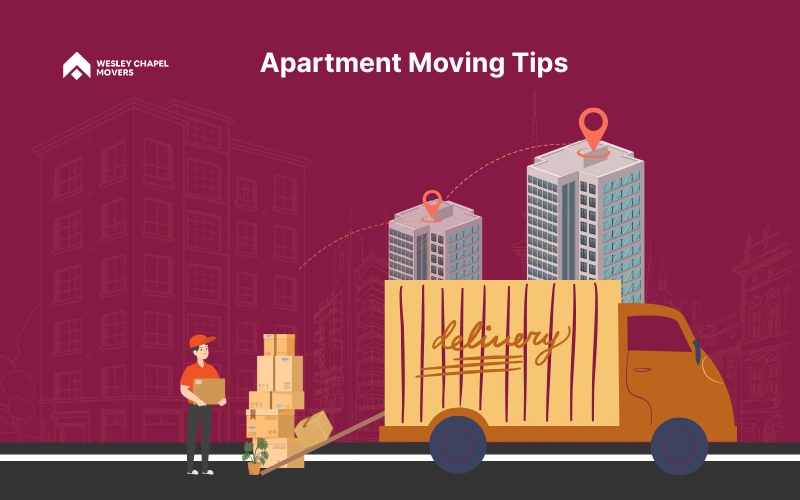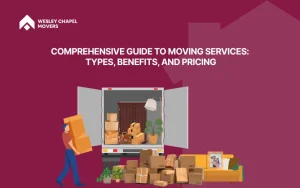Apartment moving requires careful planning, organized packing, and timely coordination to avoid unnecessary stress. Whether relocating locally in Wesley Chapel or preparing for a long-distance transition, understanding the process ensures a smoother experience.
Once your decision to move is confirmed, the next step is identifying your specific needs. Consider whether you require full-service movers, temporary storage, or only transportation. These early choices guide your budget planning and allow you to coordinate effectively with professional movers.
Proper timing helps avoid last-minute complications. Tasks like booking movers, gathering packing materials, and notifying utility providers should be scheduled well in advance. A structured checklist becomes your roadmap, dividing the process into manageable phases such as preparation, packing, coordination on moving day, and post-move setup.
Apartment moves can quickly become disorganized without a clear system. This guide simplifies the entire experience by breaking it into focused sections that address every phase. Whether you are planning your first apartment move or looking to refine your approach, you will find actionable strategies here to help you stay in control, avoid common pitfalls, and settle in smoothly.
Stages of Apartment Moving
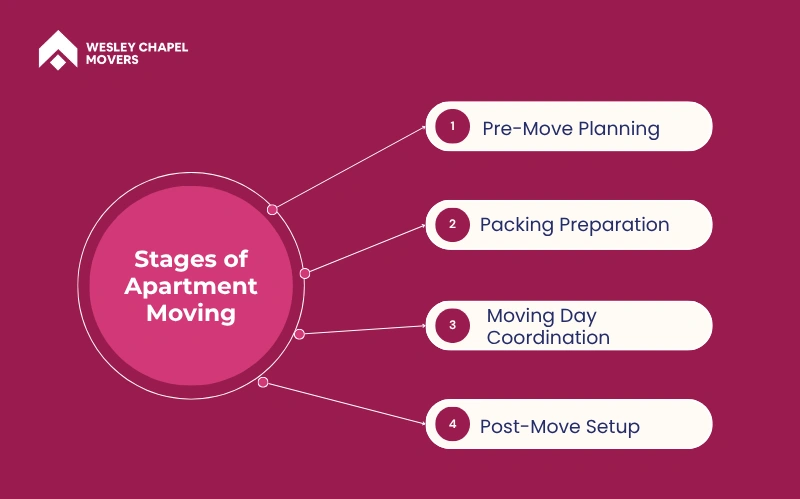
Every apartment move unfolds in key stages that include pre-move planning, packing preparation, moving day coordination, and post-move setup. Structuring your move around these phases helps reduce stress, manage time effectively, and avoid last-minute surprises. Each stage plays a distinct role in ensuring the transition is organized and efficient, from budgeting and lease prep to labeling boxes and utility setup.
Pre-Move Planning
Organizing your move starts with a clear plan that covers budget, lease readiness, and apartment research. Establishing these priorities early provides structure for everything that follows and reduces last-minute complications. To stay ahead of potential issues, consider the following steps:
- Estimate your total moving budget, including mover fees and supplies
- Review lease terms, check renewal clauses, and note move-in conditions
- Research your new apartment’s neighborhood, amenities, and logistics
Packing Preparation
A structured packing strategy makes the entire move more manageable. Working through one room at a time while decluttering and labeling helps avoid disorganization and eases unpacking later. As you prepare to pack, take these actions:
- Pack one room at a time to stay organized and focused
- Sort and declutter to avoid transporting unused or broken items
- Label each box by room and contents to streamline unpacking
Moving Day Coordination
Moving day is the result of all prior planning and preparation, so coordination is critical. Confirming key logistics and assigning responsibilities ensures that nothing gets overlooked. To keep things on track, follow these key actions:
- Reserve the elevator or loading dock ahead of time
- Assign roles to helpers or confirm professional mover details
- Conduct a final walkthrough to check closets, cabinets, and drawers
Post-Move Setup
The first days in your new apartment should focus on functionality and comfort. Once the move is complete, quickly setting up core services and essentials helps you transition smoothly into your new space. Prioritize the following tasks:
- Transfer or activate electricity, water, and internet services
- Set up key appliances and assemble necessary furniture
- Unpack essential boxes for daily use within the first few days
Step-by-Step Moving Timeline
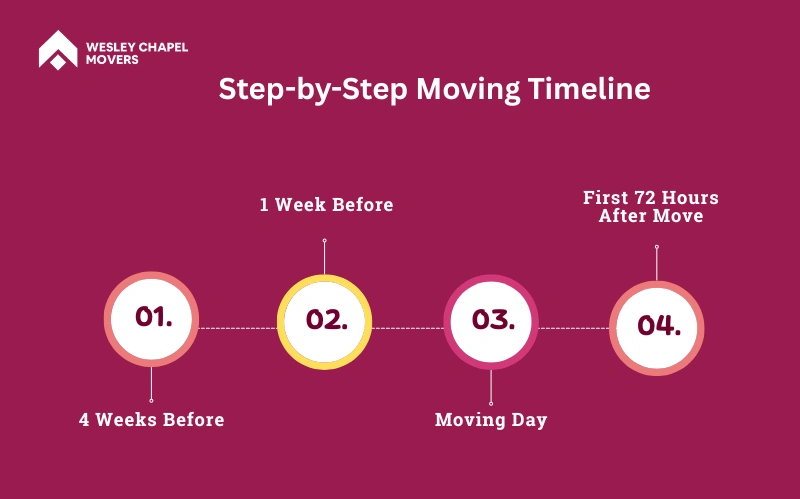
Breaking down the apartment move into timed stages helps maintain control and reduce last-minute stress. From four weeks out to the first 72 hours after moving in, each period calls for specific tasks that contribute to a seamless relocation. Organizing your actions along this timeline ensures no important step is missed and prepares you for a well-coordinated move.
4 Weeks Before
Starting your move early provides time to plan thoroughly and avoid unnecessary expenses. Four weeks out gives you enough time to book professional movers, reduce clutter, and gather essential materials. At this stage, your focus should be on preparation and decision-making that impact the rest of the move. Start by handling these core tasks:
- Book professional movers or reserve a rental truck and handcart
- Request time off from work for your moving day if needed
- Declutter closets, storage units, and furniture to reduce volume
- Create a moving folder to organize estimates, receipts, and paperwork
- Purchase or order boxes, packing tape, bubble wrap, and labeling markers
1 Week Before
With just seven days left, it is time to finalize everything you’ve prepared. The last week should focus on wrapping up loose ends, packing the remaining items, and confirming logistics to ensure there are no surprises on moving day. These tasks will help you stay organized:
- Pack non-essential items and fragile belongings securely
- Defrost and clean out your fridge and freezer if applicable
- Confirm reservations for the building elevator and loading zone
- Notify utility providers for electricity, water, gas, and internet transfers
- Submit change-of-address forms with the post office and notify key contacts
- Prepare a moving essentials box with items you’ll need immediately
Moving Day
The day of the move brings together weeks of planning. Staying organized and following a checklist ensures your belongings are moved safely and nothing is forgotten. Prevent delays or damage by focusing on these final actions:
- Wake up early and review your moving day timeline
- Complete a final walkthrough to check drawers, closets, and hidden spaces
- Supervise the loading of furniture and boxes to avoid misplacement
- Keep tools, cleaning supplies, and trash bags available for last-minute needs
- Carry valuables, IDs, leases, and payment confirmations separately
- Lock all doors and hand over keys if required by your lease
First 72 Hours After Move
The first three days in your new apartment are crucial for establishing a livable environment. Prioritizing essentials, checking for functionality, and resolving setup issues will help you settle in with less disruption. Focus your efforts on these essential tasks:
- Unpack basic needs like toiletries, bedding, kitchen tools, and work items
- Plug in and test major appliances, outlets, internet, and thermostat settings
- Assemble beds and essential furniture for each primary room
- Report any damage or maintenance issues to your landlord or property manager
- Explore the neighborhood to locate grocery stores, pharmacies, and transport options
- Update your driver’s license and local registrations if you have changed cities
Move-In Essentials Checklist
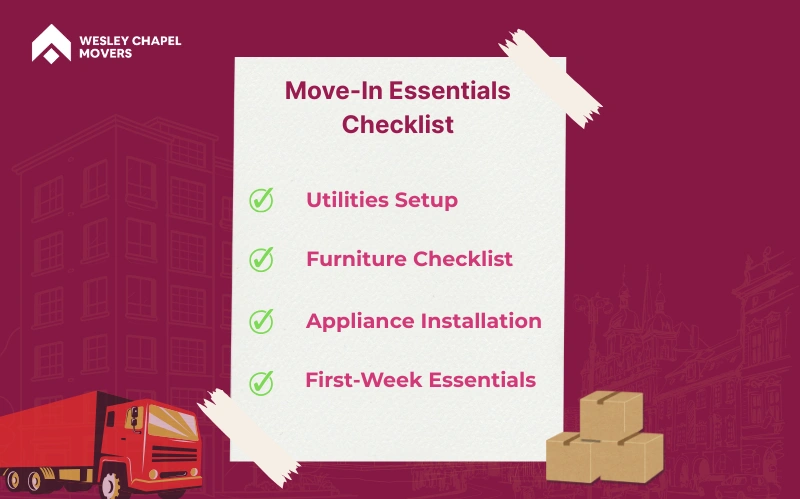
Prioritizing utility setup, arranging basic furniture, installing essential appliances, and organizing immediate-use items are the core actions that shape your first few days in a new apartment. A well-structured checklist helps ensure that electricity, water, and internet services are activated promptly, essential furniture like your bed and table are assembled without delay, and appliances such as the fridge and oven are ready for use. Keeping daily necessities like toiletries, groceries, and documents accessible allows for a smoother and more organized transition into your new space.
Utilities Setup
Utilities should be operational by the time you start unpacking. Electricity powers essential appliances, water supports hygiene and cleaning, and internet access is often critical for both work and communication. Setting these up in advance prevents common delays that could affect your ability to function in the new space. To ensure everything runs smoothly, complete the following:
- Contact electricity and water providers to transfer service to your name
- Schedule internet installation a few days before move-in or use a self-setup kit
- Activate gas service if needed for cooking or heating
- Test all light switches, outlets, and water fixtures for proper function
- Locate circuit breakers and water shutoff valves in case of emergencies
- Set up your utility account logins for online billing and service management
Furniture Checklist
Basic furniture makes your apartment livable from the first night. Prioritizing comfort and storage solutions helps prevent clutter and supports your daily routine. Instead of waiting to furnish over time, focus on getting the essentials in place to build a functional environment. Begin with this checklist:
- Assemble the bed frame, mattress, and pillows for sleeping arrangements
- Add nightstands or small tables for personal items and lighting
- Set up a dining area with a table and chairs, even in compact spaces
- Install seating like a sofa, futon, or chairs for relaxation
- Include a desk and chair if working or studying from home
- Add basic storage units such as dressers, shelves, or under-bed bins
Appliance Installation
Major appliances support your core living needs such as storing food and heating meals. Delaying installation can cause food spoilage, limit meal options, and add unnecessary stress. Early setup ensures your kitchen and other essential areas are ready to use. Check these items early on:
- Plug in and set the temperature on your refrigerator before adding groceries
- Install and test the oven and microwave to confirm they operate safely
- Ensure any washer, dryer, or dishwasher connections are secure
- Check appliance power cords and sockets for compatibility and grounding
- Clean the interiors of all appliances before use
- Contact your landlord or maintenance if appliances are not functioning properly
First-Week Essentials
Settling in during the first week requires more than just unpacking. You’ll need immediate access to hygiene items, food, documents, and basic tools to manage both comfort and continuity. Keeping these essentials within reach saves time and prevents disruption. Organize the following items first:
- Unpack toiletries, towels, and a change of clothes for the first few days
- Stock basic groceries including snacks, bottled water, and easy-to-prepare meals
- Set up a first-aid kit, flashlight, and extension cords for convenience
- Keep important documents like ID, lease, insurance, and receipts in one place
- Organize cleaning supplies for initial cleanup and routine maintenance
- Prepare a toolkit with essentials like a screwdriver, tape measure, and scissors
Moving Tips by Persona
Each apartment move presents unique challenges depending on who is moving. First-time renters may be navigating lease agreements for the first time, while seniors often need to simplify the physical process for comfort and safety. Pet owners must consider transport and adjustment for their animals, and individuals moving into walk-up apartments face physical constraints that require careful packing strategies. Understanding these varying needs helps create a smoother experience by aligning preparation and execution with the mover’s specific circumstances.
First-Time Renters
Moving into your first apartment can feel overwhelming, especially when dealing with legal documents, budgeting, and new responsibilities. Familiarizing yourself with the lease, securing your finances, and protecting your rights are foundational steps. To navigate this transition successfully, start by focusing on these essentials:
- Read the entire lease agreement and highlight renewal, sublet, and termination clauses
- Document the apartment’s condition with photos before move-in
- Clarify the rules around security deposit deductions and refund timelines
- Create a monthly budget for rent, utilities, and groceries
- Set up renters insurance to protect belongings and comply with lease terms
- Understand your rights and responsibilities as a tenant under local laws
Seniors
For seniors, a safe and comfortable move depends on reducing physical demands and planning ahead for accessibility. Simplifying the packing process and arranging support in advance helps make the transition more manageable. Consider the following steps to ensure a safer and less stressful move:
- Use smaller boxes to reduce lifting weight during packing
- Hire professional movers or enlist help from family and friends
- Pack a personal essentials bag for easy access to medications and important items
- Arrange furniture to maintain clear, unobstructed pathways
- Consider moving into a ground-floor or elevator-accessible unit
- Use mobility aids like carts or walkers during the packing and unpacking process
Pet Owners
Pets can become anxious during moves, so preparation is key to keeping them calm and safe. Managing their transport, maintaining familiar routines, and adjusting them gradually to the new environment can make a big difference. To ensure a smoother move for both you and your pet, take these important steps:
- Update your pet’s ID tags and microchip details with the new address
- Pack a separate pet bag with food, toys, litter, and medication
- Use a secure, ventilated carrier during transport
- Check your new apartment’s pet policy, including breed or size restrictions
- Introduce pets to the new space gradually, starting with one room
- Find a nearby veterinarian and locate pet-friendly parks or walking routes
Walk-Up Apartment Movers
Moving into a walk-up apartment involves unique physical challenges that require strategic planning. Stair navigation with furniture and boxes can be tiring and risky without the right approach. Minimize strain and improve safety by following these practical guidelines:
- Pack lighter boxes and avoid overloading to reduce weight per trip
- Disassemble large furniture to make items easier to carry
- Use lifting straps, dollies, or hand trucks for bulky items
- Wear supportive shoes with good traction for stair navigation
- Coordinate with helpers to create an efficient carry-and-pass routine
- Reserve extra time on moving day to account for slower stair access
Hiring Professional Moving Services in Wesley Chapel
In Wesley Chapel, hiring a professional moving company can streamline your apartment relocation by minimizing delays, protecting belongings, and reducing physical demands. Whether you are managing a local move or preparing for a long-distance transition, understanding the differences in service types is essential. Local moves are typically charged hourly, while long-distance relocations often involve fixed or mileage-based pricing and longer lead times.As a trusted name in the region, Wesley Chapel Movers delivers customized solutions for apartment moves of all sizes. We provide end-to-end services including packing, loading, short-term storage, and transportation, tailored to fit complex schedules and building constraints. Our team is equipped to handle stair access, fragile items, and time-sensitive moves with professionalism and care. By combining reliability with transparent pricing, we help ensure your move is both seamless and well-coordinated.
